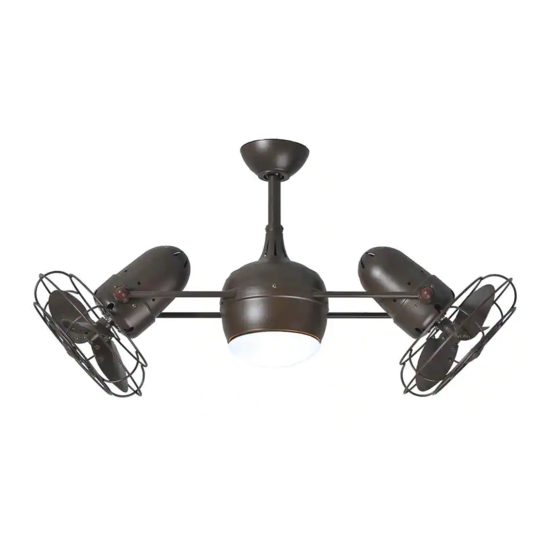Atlas DAGNY 사용 설명서 - 페이지 10
{카테고리_이름} Atlas DAGNY에 대한 사용 설명서을 온라인으로 검색하거나 PDF를 다운로드하세요. Atlas DAGNY 10 페이지. Ceiling mounted rotational fan

REGULATION OF ROTATION OF FAN UNIT
1.
Regulate
speed
increasing or decreasing the power at the remote control, regulating the speed of fan heads
and varying the position of the motor heads. See number 2 below
2. Vary position
of motor heads.
heads to the horizontal support rods, the greater the speed of rotation.
the fan head, the less the speed of rotation.
CARE OF AND TROUBLESHOOTING YOUR FAN
1. Check hardware bi-yearly.
may become loose over time. Check the support connections, brackets and blade attachments
twice a year. Make sure they are secure. It is not necessary to remove fan from the ceiling.
2. Clean your fan periodically.
years. Use only a lightly water-moistened,
finishes are sealed with lacquer to minimize discoloration or tarnishing. Do not let rain or running
water to come in contact with the fan.
blades or possibly cause an electrical shock.
3. There is no need to oil your fan. The motor has permanently lubricated bearings.
4.
Fan makes a vibration
connection to the motor face plate.
5. Fan vibrates or makes grinding
Make sure that your fan head's set screw is counter-sunk into the bore hole in the flat part of the
motor shaft. Be careful that the blade brackets themselves are not bent in this process. Do not
operate your fan if it continues to vibrate. Contact your Atlas Fan Co purveyor if the re-installation
of the blades does not resolve the problem.
6. Clicking
noise from inside of center of fan.
noises are normally heard from the braking mechanism within the fan body.
bothersome, slow the unit down. To do this, see "Regulation of Rotation" section above.
7. Fan is not rotating or doing so unevenly.
verify that coupling cover has at least 1/8 - 1/4" clearance between it and fan motor assembly,
otherwise coupling cover will act as a brake, impeding rotation.
of fan. The rotation of the fan can be sped up or slowed down by
The greater the angle (either up or down) of the motor
Because of the fan's mechanical movement some connections
This will help to help maintain its new appearance over the
Rain or running water could damage the motor, wood
noise. Check to see that all screws are tight in the fan cage
noise as blades rotate. Uninstall and reinstall the blades.
lint free cloth to avoid scratching the finish. Plated
As unit rotates at higher R.P.M.s, clicking
See "Regulation of Rotation" section above and
9
The less the angle of
If the noise is
